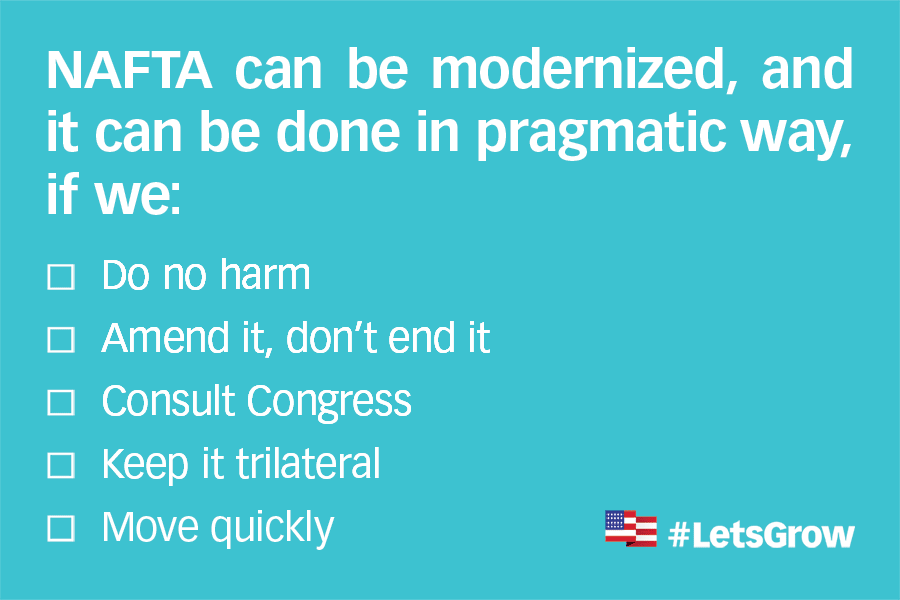Published
May 08, 2017
Trade with Canada and Mexico is a significant driver of U.S. economic growth. More than 125,000 small and medium-size businesses export to our two North American neighbors, and they are our largest export markets by far. Most important, trade with Canada and Mexico supports 14 million American jobs. NAFTA is the foundation of this prosperous relationship, and as our nation engages in a debate over its future, we must start by acknowledging the value of the deal to our economic well-being.
President Donald Trump recently said that it would be his “privilege to bring NAFTA up to date through renegotiation.” The business community welcomes the opportunity to modernize the agreement. After all, it was first negotiated 25 years ago—before e-commerce and the digital economy existed. But we believe that any efforts to modernize NAFTA must be guided by a few key objectives.
The first is to do no harm. We must not disrupt the $1.3 trillion in annual trade that crosses our borders because of NAFTA. Reverting to the high tariffs and other trade barriers that were in place before the agreement could risk millions of American jobs.
Further, to avoid lost exports and lost jobs, we should amend it, not end it. NAFTA already has an amendment process built in to ensure that it can be modified as needed. We can work within that process while preserving the many parts of the agreement that are working well.
Next, we should keep the agreement trilateral. Transitioning to entirely new bilateral agreements could interrupt commerce. Introducing divergent rules—one set for trade with Canada and another for trade with Mexico—would only raise costs for businesses. That could sap our competitiveness and hobble our industries.
U.S. negotiators must consult Congress by following the Trade Promotion Authority (TPA) law, which the U.S. Chamber of Commerce helped pass in 2015. TPA already has the buy-in of lawmakers and the business and farming communities. It will also help build support for a modernization agreement in Congress.
Finally, we must move quickly. Uncertainty about the future of trade with Canada and Mexico would suppress economic growth in all three countries. It could also spur a political reaction that would harm our trade ties.
A swift renegotiation following the objectives I’ve mentioned could deliver benefits and limit risks. The Chamber is dedicated to promoting pragmatic and productive negotiations. We will not let up until we achieve an even stronger NAFTA—one that reinforces our crucial trade relationships with Canada and Mexico and reaffirms North American competitiveness in the global economy.
About the authors

Thomas J. Donohue
Thomas J. Donohue is advisor and former chief executive officer of the U.S. Chamber of Commerce.





